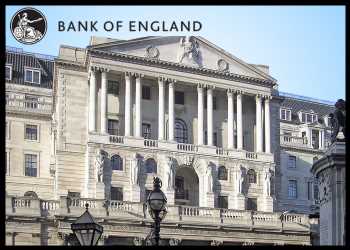Bank Of England Hikes Rate By 50 Bps; Softens Guidance
The Bank of England raised its benchmark rate by a half percentage point on Thursday citing stronger-than-expected wage growth but softened its stance on future tightening as inflation is set to return to the target in medium term.
The Monetary Policy Committee voted 7-2 to raise the bank rate by 50 basis points to 4.00 percent, the highest since 2008.
Swati Dhingra and Silvana Tenreyro voted to maintain status quo. They argued that the effects of the past increases were still to come through and the current rate setting would reduce inflation to well below the target in the medium-term.
In the current tightening cycle that began in December 2021, the rate was raised by 390 basis points. The rate hikes added hardship on households with mortgages.
A majority of policymakers said a 0.5 percentage point increase in Bank Rate at this meeting would address the risk that domestic wage and price pressures remained elevated even as external cost pressures waned.
“If there were to be evidence of more persistent pressures, then further tightening in monetary policy would be required,” the MPC said.
In the earlier meetings, the bank repeatedly said the rate could be hiked forcefully. Today the word “forcefully” was dropped signaling smaller increments going forward.
Economists at ING expect one further 25 basis point rate hike in March, though a rate cut is set to be unlikely for at least a year.
The decision came a day after the US Federal Reserve softened its pace of tightening. The Fed raised the target range for the federal funds rate by 25 basis points to 4.50 to 4.75 percent.
In the monetary policy report, the BoE said inflation is expected to fall quickly this year and the recession would be much shallower than projected in November. However, growth is forecast to remain well below pre-pandemic rates.
Inflation is seen falling to around 4 percent towards the end of this year and to hit the 2 percent target sustainably in the medium term.
Inflation has turned the corner, Governor Andrew Bailey said at the press conference.
Gross domestic product is expected to shrink 0.1 percent in the first quarter of 2023 and to contract 0.5 percent in the whole year as high energy prices and the path of market interest rates weigh on output.
The International Monetary Fund provided a much bleaker outlook early this week. The IMF downgraded UK’s GDP outlook for this year by 0.9 percentage point to -0.6 percent, citing tighter fiscal and monetary policies and financial conditions.
Source: Read Full Article

